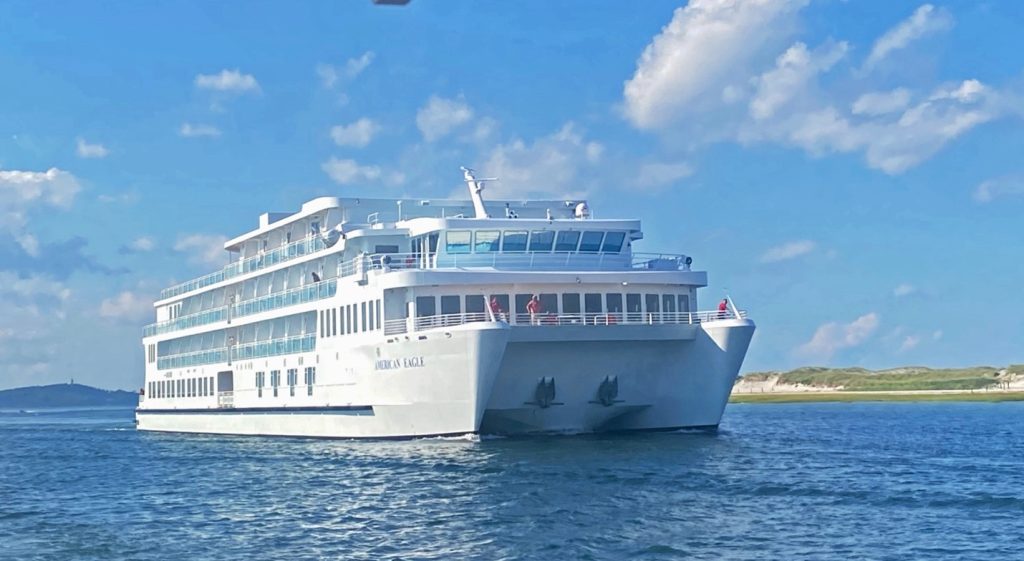When the Plymouth Select Board in January pondered a proposal to let cruise ships dock in the harbor again this summer, local fishermen showed up to protest the plan.
They were worried that their fishing season— already shortened by federal rules protecting whales — would be further cut back to accommodate the ships, which carry about 100 passengers.
The board debated the pros and cons before voting 5-0 to have American Cruise Line ships visit Plymouth 23 times in 2024.
Left out of the 30-minute discussion were the fishermen, who sat silently while the contract was approved.
Only near the end of the meeting — during the Select Board’s “public comment period” — were the fishermen allowed to weigh in. By then, their arguments were moot. The contract was already a done deal.
“How can the selectmen take a vote on something and then have public comment after the vote?” said Tom O’Reilly, one of the lobstermen at that meeting. “It’s backwards. At least give the appearance you care. It is so wrong.”
The timing of the public comment period near the end of the Select Board meeting — is uncommon in Massachusetts.
More than 150 communities open the floor to the public at the beginning of select board meetings, an Independent review found.
That way, residents can express their opinions before votes on controversial measures.
Other local committees have varying public comment policies, according to town records. The School Committee gives the public a chance to speak at the beginning of meetings while the Community Preservation Committee sometimes holds public comment at the beginning of meetings and sometimes at the end. The Planning Board lets residents comment when a particular proposal is under consideration.
Officials are not required to have a public comment period during board meetings, and some nearby towns — including Halifax, Hull, and Marshfield— do not. But officials in Halifax and Hull said they do allow the public to comment on agenda items as they come up.
A few other communities reserve public comment for the end of meetings, the review found, to minimize the chances that exchanges turn ugly.
“They yell and we take it,” said Canton select board vice chair John Connolly. “We stopped (public comment) for a while but people showed up and put tape on their mouths: ‘We want to be heard.’”
He said the select board intentionally moved public comment to the end of meetings to avoid disruptions.
Hingham and Pembroke also schedule public comment at the end of meetings, but officials in both towns said they also allow residents to speak on individual agenda items as they come up for discussion.
In Plymouth, it wasn’t always this way at Select Board meetings.
Before Richard Quintal became chair last May, residents were often given a chance to speak at or near the beginning of meetings, not at the end.
By June, some residents were beginning to complain about the apparent scheduling shift.
Richard Serkey, a lawyer and town meeting member who had gotten into some strained debates during public comment with former Select Board chair Betty Cavacco, complained that the public had no input before the board appointed people to key boards and committees.
He told the Independent that residents were being “muzzled” by being allowed to speak only after topics they wished to discuss had been decided by the board.
“By the time you get to public comment, the votes have already been taken,” said Serkey, a retired lawyer and active Town Meeting member. “The best approach would be to allow public comment on an agenda item when it’s being discussed — not afterwards, when it’s moot.”
Also raising concerns about the timing of public comment were public interest environmental lawyer Meg Sheehan and DPW union leader Dale Webber.
According to Select Board minutes from Jan. 16, Sheehan “feels that the public comment at the end is not effective and unfair to the public.”

Quintal said there is “no rhyme or reason” to the scheduling of public comment, and that it has taken place at various times during meetings, though he acknowledged it has recently drifted toward the end.
“It’s more organized to have it as it is,” he said. “It’s been working out well. If it was a problem, I would, naturally, change it.”
He said that when people request to speak at another time during meetings, he generally allows them to chime in.
“I would let them talk,” he said. “I’ve done that many times.”
But a review of available meeting minutes from 2023 and 2024 turned up only one instance, on Nov. 7, when the public was invited to comment on an item under discussion by the board —the nip ban, which had been approved by Town Meeting in October but was now being challenged. (The ban was overturned by voters in a special January town election.)
As for the cruise line contract, Quintal said the fishermen’s views were well known to board members, who had met with them several times before the Jan. 9 vote.
At the January meeting, Town Manager Derek Brindisi outlined the various ways the town tried to accommodate them.
He said the town entered into a one-year contract with American Cruise Lines, even though it was prepared to sign a 20-year deal.
And, Brindisi said, the town pledged to make sure the fishermen would still have access to three winches on the town pier— mini cranes used to get fishing gear off and on boats.
Quintal insisted that the fishermen had many opportunities to voice their opinion and didn’t need to be heard again before the vote. “If someone needs to say something, go ahead and say your peace,” said Quintal. “I never stopped anyone from speaking who wants to — unless it’s an item we’ve heard 30 times already. I’m trying to be honest with you.”
Andrea Estes can be reached at andrea@plymouthindependent.org.

